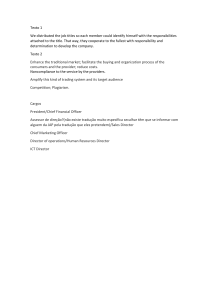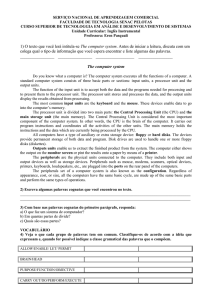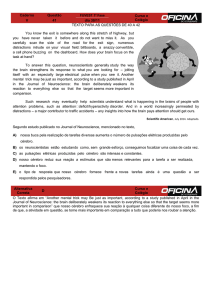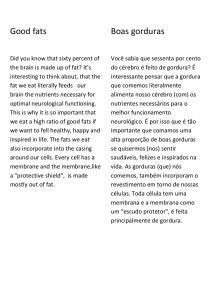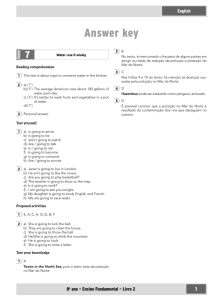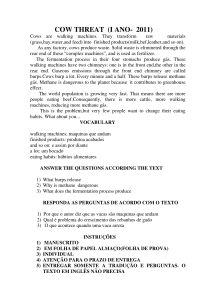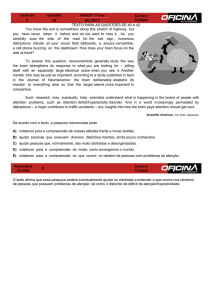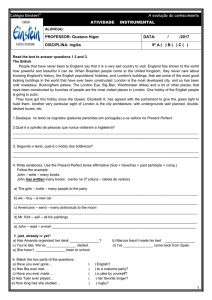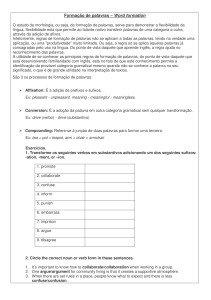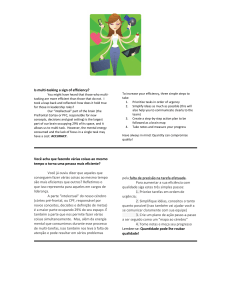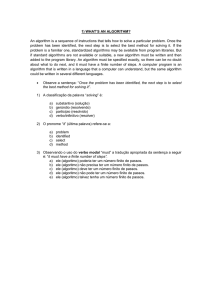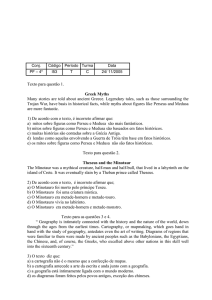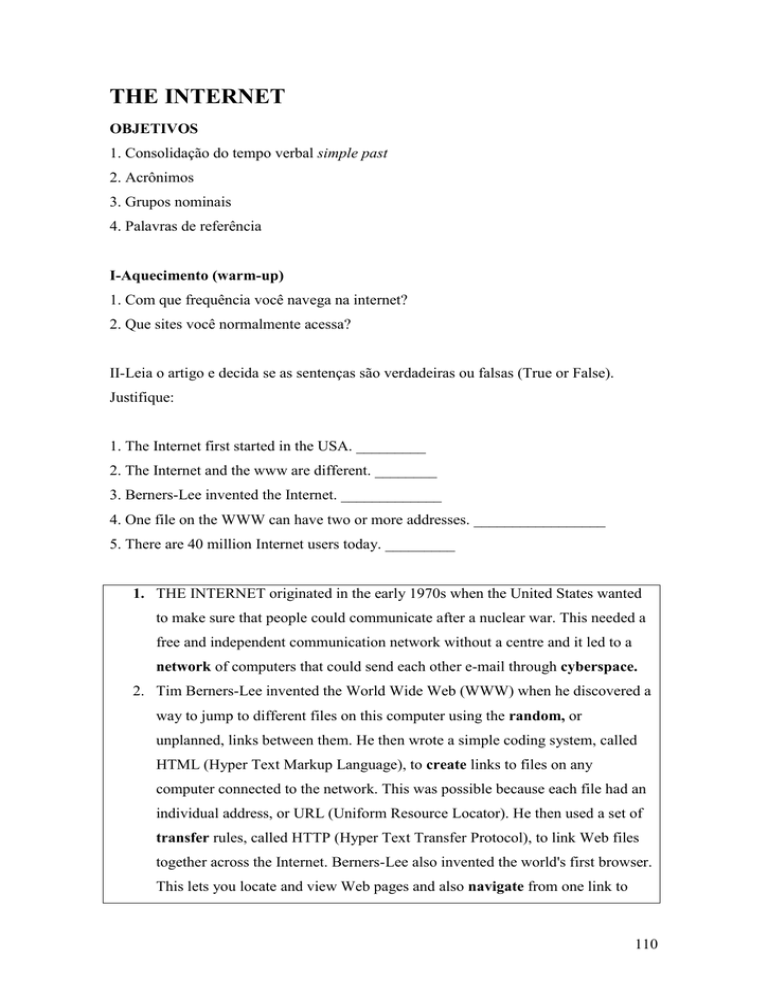
THE INTERNET
OBJETIVOS
1. Consolidação do tempo verbal simple past
2. Acrônimos
3. Grupos nominais
4. Palavras de referência
I-Aquecimento (warm-up)
1. Com que frequência você navega na internet?
2. Que sites você normalmente acessa?
II-Leia o artigo e decida se as sentenças são verdadeiras ou falsas (True or False).
Justifique:
1. The Internet first started in the USA. _________
2. The Internet and the www are different. ________
3. Berners-Lee invented the Internet. _____________
4. One file on the WWW can have two or more addresses. _________________
5. There are 40 million Internet users today. _________
1. THE INTERNET originated in the early 1970s when the United States wanted
to make sure that people could communicate after a nuclear war. This needed a
free and independent communication network without a centre and it led to a
network of computers that could send each other e-mail through cyberspace.
2. Tim Berners-Lee invented the World Wide Web (WWW) when he discovered a
way to jump to different files on this computer using the random, or
unplanned, links between them. He then wrote a simple coding system, called
HTML (Hyper Text Markup Language), to create links to files on any
computer connected to the network. This was possible because each file had an
individual address, or URL (Uniform Resource Locator). He then used a set of
transfer rules, called HTTP (Hyper Text Transfer Protocol), to link Web files
together across the Internet. Berners-Lee also invented the world's first browser.
This lets you locate and view Web pages and also navigate from one link to
110
another.
3. The WWW became available to everyone in 1991 and the number of Internet
users grew from 600,000 to 40 million in five years. Today, that number is
much larger and there are now many browsers that provide Web pages,
information and other services. You can also do research, download music files,
play interactive games, shop, talk in chat rooms and send and receive e-mail on
the WWW.
III-Encontre a palavra correta ou acrônimo (abreviação) no texto.
1. an address for Web pages ______________________________________________
2. a coding system that creates links _________________________________________
3. this finds and shows Web pages __________________________________________
4. rules for transferring files _______________________________________________
5. a group of computers joined together. ______________________________________
IV-Ligue os grupos de verbos abaixo com o significado geral na tabela.
move
make
start
join
look at
find
1. browse, surf, view _______________________________________
2. download, navigate, transfer _______________________________
3. connect, link ____________________________________________
4. discover, locate __________________________________________
5. originate, create, invent ____________________________________
V-Complete as sentenças com uma palavra em negrito do texto:
1. Some people spend too much time playing ______________ games on the Internet.
2. You can sometimes have a computer___________ that is not connected to the
Internet.
3. It is easy to _________________ around a screen with a mouse.
4. Berners -Lee discovered how to _______________________ links between
computers in new ways.
111
5. Some people surf the Internet at _____________, just to see what they can find.
6. People use the Internet to _____________ information from one place to another.
7. When you surf the Internet, you are travelling in ________________.
VI-Encontre 3 grupos nominais no texto e traduza-os
GRUPOS NOMINAIS
TRADUÇÃO
1-
1-
2-
2-
3-
3-
VII-A que se referem as seguintes palavras:
1. when (par. 1 linha 1) __________________________________________________
2. He (par. 2, linha 1) ___________________________________________________
3. This (par. 2, linha 9) _________________________________________________
VIII-Como o texto narra como foi o início da Internet o autor recorreu ao tempo verbal
no passado. Volte ao texto e copie todos os verbos regulares (que estejam no passado ou
no presente/infinitivo) e dê sua tradução. O primeiro já foi feito para você.
VERBOS REGULARES
TRADUÇÃO
VERBOS REGULARES
1. originate –
11.
2.
12.
3.
13.
4.
14.
5.
15.
6.
16.
7.
17.
8.
18.
9.
19.
10.
20.
TRADUÇÃO
112
IX-Abaixo se encontram os verbos irregulares que apareceram no texto, ou no passado
ou no presente. Usando o dicionário ou a lista de verbos em anexo complete os espaços
que estão em branco e traduza-os. Exemplo:
INFINITIVO
PASSADO
PARTICÍPIO
TRADUÇÃO
PASSADO
1. lead
led
led
levar, conduzir,
guiar,etc.
2.
wrote
3.
had
4. let
5-
made
6. send
7.
became
8.
grew
113
ACRÔNIMOS
Muitas palavras inglesas, principalmente na área de informática, são acrônimos: siglas
formadas pela primeira letra (ou mais de uma) de palavras que compõem um termo ou
expressão.
EXERCÍCIOS
1. Relacione o acrônimo à sua definição:
ACRÔNIMO
DEFINIÇÃO
1. CPU
a) Mega Hertz
2. I/O
b) Control Unit
3. ROM
c) Instruction Register
4. RAM
d) Central Processing Unit
5. DIMM
e) Program Counter
6. CU
f) Read-Only Memory
7. ALU
g) Input/Output
8. IR
h) Double In-Line Memory Module
9. PC
i) Random Access Memory
10. MHz
j) Arithmetic Logic Unit
2. No texto há 4 acrônimos. Procure-os e escreva-os abaixo e pense em uma possível
tradução para o termo:
ACRÔNIMO
DEFINIÇÃO EM INGLÊS
TRADUÇÃO
A.
B.
C.
D.
114
SCHOOLING OF THE FUTURE (additional work on futureprediction)
1) Leia o texto Schooling of the future e responda à seguinte pergunta:
a) O narrador é a favor ou contra os desenvolvimentos mencionados?
Schooling of the Future
1. In the near future all schools and libraries will be linked together to form a National
Grid for Learning – just like the electricity grid which connects all consumers. Each
pupil will have a palmtop linked to the school network and to the Internet. All pupils
from the age of nine will have email accounts.
2. All communications between the Department for Education and schools will be by
computer links. Learning and administration will be paper-free. The advantages are
obvious. Pupils will have access to a world of learning. The resources available
through the Grid will be greater than any one school can provide.
3. In addition, all pupils will become familiar with information technology at an early
stage in their school life. Their computer skills will help them when they leave school
and enter college or go into work. All study and most jobs in the future will require
computer literacy. These developments will equip our pupils for an IT-based future.
4. Email will allow pupils to communicate easily with other pupils in different parts of
the country and in different parts of the world. It will develop communications skills
and encourage an international outlook.
5. Finally, by freeing teachers from paperwork, IT will give them more time for their
real job of inspiring students.
2) Leia o texto novamente e responda se as sentenças são falsas ou verdadeiras. Indique
em que parágrafo e linha você encontrou a resposta:
a) Os estudantes terão acesso a um mundo de conhecimento porque todos terão um
palmtop conectado com a rede escolar e a Internet.
115
b) Os estudantes estarão familiarizados com a TI a partir da adolescência.
c) Quando os alunos chegarem à faculdade ou ao mercado de trabalho não terão
dificuldade com a informática.
d) As habilidades de comunicação dos estudantes serão aperfeiçoadas por meio dos
video games.
e) Os professores terão mais trabalhos para corrigir.
3) Relacione as palavras da primeira coluna à sua definição na segunda:
a) allow (v)
a) a place where books, documents, CDs
b) available
etc are available for you to look at or
c) account
borrow
d) literacy
e) library
b) an arrangement you have with a
company or Internet PROVIDER to use a
service they provide
c) able to be obtained, taken, or used
d) the ability to read and write
e) to give someone or something the time
or opportunity to do something
4) A que se referem as seguintes palavras:
a) their ( par. 3 – linha 2)________________________________________________
b) them (par.3, linha 2) ___________________________________________________
c) them (par.5, linha 1) ___________________________________________________
5) Volte ao texto e escolha uma previsão que você acha tem mais probabilidade de
acontecer e traduza-a. Compare sua escolha com a de seu colega.
_____________________________________________________________________
_____________________________________________________________________
116
RESEARCH ON THE INTERNET
-
Obter informações específicas do texto.
-
Identificar o uso da voz passiva
-
Revisão de modais
-
Referência contextual
I-Aquecimento (Warm-up)
1) Qual é o melhor lugar para encontrar informações sobre os seguintes tópicos:
European history
the price of mobile phones
our favourite pop star
2) Quais são as vantagens e desvantagens de procurar informações nas seguintes
fontes:
books
magazines
newspapers
libraries
encyclopaedias
friends or family
teachers
CD-ROMs
television
radio
the Internet
3) Leia o texto rapidamente e escolha a resposta correta.
a) Google is a keyword / search engine.
b) This WORD is in upper / lower case.
c) AND / WHEN is a logical operator.
1. Finding information on the World Wide Web needs an Internet search engine such
as Google, Alta Vista or Yahoo. Search engines have a text box where you type in a
keyword or words. A search engine is a software program that reads the keywords in
the text box and searches the Internet for web pages, Websites, and other Internet files
that use them. These documents are shown on the computer screen in a results listing.
2. When carrying out searches, you should usually be specific and brief in your choice
of words. If the keyword is too general, or includes too many different meanings, the
results listing may not be useful. Different search engines categorize information in
different ways, which changes the way they store and retrieve it.
3. Using upper case letters (capital letters) in a keyword search will only retrieve
documents that are upper case. Typing in lower case (no capitals) is usually better
117
because search engines will retrieve documents that use both upper case and lower case
letters.
4. You can narrow a search engine using logical operators such as AND, OR and NOT.
AND retrieves all the words typed in the text box, OR retrieves either of the words and
NOT excludes words. Spelling is important when typing in keywords, but a search
engine will not usually read punctuation, prepositions, and articles.
4. Abaixo você encontrará instruções sobre o que deve e o que não deve ser feito
quando se procura informações na Internet. Assinale as instruções que você
considera adequadas.
a) Escolha palavras que são diferentes do item que você quer. ____________
b) Dê a palavra-chave mais adequada para descrever o que você quer. ___________
c) Use várias palavras-chave. ________________________________
d) Tente usar uma palavra-chave que tenha somente um significado. __________
e) Digite suas palavras-chave somente em letras minúsculas._______________
f) Use operadores lógicos para delimitar sua pesquisa. __________________
g) Use ponto final e vírgula. _________________________
h) Não use palavras como AT, IN, ON, A/AN e THE. _____________________
5. Encontre palavras e expressões no texto que signifiquem:
a) claro e exato (§ 2) ______________________________________________
b) colocar em grupos semelhantes (§2) ________________________________
c) recuperar, trazer de volta (§2) _________________________________________
d) diminuir, limitar, delimitar (§4) ______________________________________
e) palavras matemáticas (§4) ____________________________________
6) Encontre no texto duas sentenças com verbos modais que indicam:
a) Previsão para o futuro _____________________________________________
b) Conselho_________________________________________________________
7) Encontre no texto um adjetivo comparativo irregular: ______________________
8- Diga a que se referem as palavras:
a) them (§1, linha 5) ________________________________________________
b) that (§3, linha 2) _________________________________________________
118
VOZ PASSIVA
I-Como formamos a voz passiva em português?
II-Leia as seguintes sentenças:
The abacus was invented and was used until the 16th century.
It is still used today in some parts of the world to make arithmetical
calculations.
III-Que regra para a formação da voz passiva você pode deduzir a partir dos dois
exemplos?
IV-Você percebe alguma diferença no modo de formação da voz passiva entre o
português e o inglês?
Informações gerais sobre a voz passiva e ativa:
1. Usamos a voz ativa quando queremos enfatizar tanto o agente quanto a ação: A
police officer requests records of a suspect.
2. Quando queremos enfatizar mais a ação do que o agente, ou quando é bem claro
quem ou o que é o agente, usamos a voz passiva: Records of a suspect are requested.
3. Formamos a voz passiva usando o verbo TO BE (presente)+o particípio passado do
verbo principal (-ed para verbos regulares e a 3ª coluna para verbos irregulares).
4. Para outros tempos verbais, quem define o tempo é sempre o verbo TO BE. Por
exemplo:
a) The computer was fixed by a good technician.
b) The computer can be fixed by my father.
c) The computer will be fixed by my father.
d) The computer should be fixed by my father.
.....
V-Volte ao texto anterior e procure uma sentença que esteja na voz passiva.
___________________________________________________________________
119
CAREERS IN IT
-
Obter informações específicas do texto.
-
Identificar o uso do presente contínuo
-
Identificar modos de expressar preferências
-
Formação de palavras
-
Grupos nominais
-
Referência contextual
I-Aquecimento (warm-up)
1) Discuta as perguntas em pares:
a) quais são seus planos após terminar a faculdade?
b) Você quer usar/ você usa ou você precisará usar TI em seu emprego?
c) Faça uma lista de empregos que usam TI/IT.
2- Leia as citações abaixo e escreva o nome dos estudantes em frente dos empregos
que eles querem:
1) Web designer _______________________________________________
2) Computer programmer ________________________________________
3) Database administrator ________________________________________
4) E-commerce manager _________________________________________
Elissa
1. "I'm interested in writing software. My friends say I'm a techno nerd because I
prefer working with computers to people. Money is important but I'd rather do a
job I enjoy. I am taking a distance-learning course so I can study at home."
Katie
1. "I like shopping and I think the future of business is on the internet. I'm good
with computers but I also like working with people. At the moment I'm working
in a shop, I'm a shop assistant, but I would like to manage my own online
company. This will give me a lot of responsibility. E-commerce comes with
risks, But the rewards are high when you succeed".
120
Martin
1. "Many people like Web design, but I think data management gives more job
security. There is so much information on the Internet, and companies need
people who know how to store, manage, and retrieve data. I am studying
Computer Science and I want to get my degree and work for a good company."
Peter
1. "I'm using JavaScript to make my website more interactive. After college, I'd
like to try telecommuting. This is working at home, using e-mail to
communicate with clients. I want freedom, flexibility, and long holidays, which
you don't get by working in an office. Working in an office is really
uninteresting."
3- Escreva E, K, M ou P. Qual estudante:
a) quer trabalhar em casa? ______________________________________________
b) quer um emprego seguro? ____________________________________________
c) não quer fazer faculdade?___________________________________________
d) quer escolher quando trabalhar?________________________________________
e) quer gerenciar pessoas? ___________________________________________
f) gosta de trabalhar com informações?__________________________________
g) quer ser rico e bem-sucedido?_________________________________________
h) usa um sistema de codificação para fazer páginas na web?__________________
VOCABULARY EXERCISE
I - Sublinhe os modos de expressar LIKE ou WANT nas citações. Em seguida, escolha
a resposta correta.
1) ________________telecommuting to working in an office.
a) I'd rather
b) I prefer
c) I like
2) __________________to do a distance-learning course.
a) I'd prefer
b) I'd rather
c) I don't like
3) ______________working long hours all the time.
a) I'd prefer
b) I don't like
c) It's good
4) ____________________to work with computers all day as I think it would be boring.
a) I'd rather not
b) I wouldn't like
c) I don't like
121
5) _____________ be a rich techno-nerd than poor and popular.
a) I'd rather
b) I prefer
c) I like
6) ___________________in being a secretary. I want a better job.
a) I am not interested
b) I'm thinking of
c) I don't like
II-Procure no texto exemplos de sentenças que contenham um tempo verbal que indica
que a ação está ocorrendo no momento.
______________________________________________________________________
______________________________________________________________________
III-Encontre no texto dois grupos nominais e traduza-os:
a) ____________________________________________________________________
b) ____________________________________________________________________
IV-A que se referem as seguintes palavras no texto:
a) this (Katie, linha 4) ____________________________________________________
b) who (Martin, linha 3) __________________________________________________
c- which (Peter , linha 3) _________________________________________________
V-Explique a formação das seguintes palavras:
Palavra
Prefixo?
Sufixo?
Raiz?
Justaposição
de palavras?
website
software
Internet
uninteresting
122
PRESENT CONTINUOUS X PRESENT SIMPLE
I-Observe os seguintes exemplos:
Many people like Web design, but I think data management gives more job
security.
I like shopping and I think the future of business is on the Internet.
I am studying Computer Science.
I'm using JavaScript to make my website more interactive
Responda:
1) Que tempo verbal os estudantes usam para falar de ações permanentes, opiniões?
2) ações que estão acontecendo no momento?
INFORMAÇÕES SOBRE O PRESENTE CONTÍNUO
Usamos o presente contínuo para falar de ações que estão acontecendo no momento.
Ele é formado com o verbo TO BE+ VERBO PRINCIPAL + ING
INFORMAÇÕES SOBRE WOULD RATHER X WOULD PREFERX PREFER
GRAMMAR NOTES
EXAMPLES
1. Use prefer, would prefer, and would - We usually prefer Italian food.
rather to talk about things or activities - I'd prefer to have Chinese food tonight.
that you like better than other things or - I'd rather cook at home.
activities.
USAGE NOTES
I'd rather go.
a. We usually use the contraction for Not: I would rather go.
would in speech and informal writing.
b. We often use prefer to express a Which do you prefer – action movies or
general preference.
romantic comedies?
c. We use would prefer or would rather I usually prefer action movies, but tonight
to talk about a preference in a specific I'd prefer a romantic comedy.
situation.
I'd rather go to the rock concert next
weekend.
BE CAREFUL! Do not use will to talk Not I will rather go to the rock concert
about preferences.
next weekend.
123
JAVA TECHNOLOGY
-
Obter informações específicas do texto.
-
Identificar o uso do present perfect
-
Formação de palavras
-
Referência contextual
I-Aquecimento (warm up)
1) Discuta as seguintes perguntas:
a) O que é a tecnologia Java?
b) Você a usa?
c) Quais são suas vantagens?
2- Leia o texto e responda se as afirmações são verdadeiras (V) ou Falsas (F)?
Justifique com partes do texto. Mencione as linhas e os parágrafos.
a. É possível rodar uma aplicação baseada na tecnologia Java em um PC.
___________________________________________________________________
___________________________________________________________________
b. Com a tecnologia Java, programadores e usuários podem fazer coisas com as
páginas da Web as quais eles não podiam anteriormente.
___________________________________________________________________
___________________________________________________________________
c. Algumas empresas estão usando software baseado na tecnologia Java em seus
Web sites internos com a finalidade de facilitar a comunicação e o fluxo de
informação exclusivamente entre os departamentos.
___________________________________________________________________
___________________________________________________________________
1. The Java platform is based on the power of networks and the idea that the same
software should run on many different kinds of computers, consumer gadgets, and other
devices. Since its initial commercial release in 1995, Java technology has grown in
popularity and usage because of its portability. The Java platform allows you to run the
same Java application on lots of different kinds of computers. Any Java application can
124
easily be delivered over the Internet, or any network, without operating system or
hardware platform compatibility issues. For example, you could run a Java technology
based application on a PC, a Macintosh computer, a network computer, or even new
technologies like Internet screen phones. Furthermore, the Java platform was designed
to run programs securely on networks, which means that it integrates safely with the
existing systems on your network.
2. The idea is simple: Java technology-based software can work just about everywhere.
Java technology components don't care what kind of computer, phone, TV, or operating
system they run on. They just work on any kind of compatible device that supports the
Java platform.
3. Java technology allows programmers and users to do new things with Web pages that
were impossible before. With Java technology, the Internet and private networks
become your computing environment. For example, users can securely access their
personal information and applications when they're far away from the office by using
any computer that's connected to the Internet; soon they'll be able to access tailored
applications from a mobile phone base on the Java platform, or even use smart cards as
a pass key to everything from the cash machine to ski lifts.
4. The Java platform is being built into next-generation telephones, TV set-top boxes,
smart cards that fit in your wallet, and many other consumer and business devices. Java
technology-based software includes: programs written in the Java programming
language can run directly on your computer (without requiring a browser), or on
servers, on large mainframe computers, or other devices.
5. For example, Java technology-based software running on servers in large companies
monitors transactions and ties together data from existing computer systems. Other
companies are using Java technology-based software on their internal Web sites to
streamline communication and the flow of information between departments, suppliers
and customers.
Interested in learning more about Java technology? Read on!
Feature stories about Java technology
http://java.sun.com/features/
125
New to Java Programming Center
http://developer.java.sun.com/developer/onlineTraining/new2java
3- A que se referem as palavras em negrito?
a. Since its initial commercial release in 1995, Java technology has grown in popularity
and usage (paragraph 1):
_______________________________________________________________
b . … which means that it integrates safely with the existing systems on your network.
(paragraph 1):
____________________________________________________________________
c. Other companies are using Java technology-based software on their internal Web
sites (paragraph 5):
____________________________________________________________________
4- Encontre as palavras abaixo no texto e forneça suas raízes (roots or stems).
PALAVRA►
em Inglês
RAIZ►
em Inglês
a) fornecedores=
b) diretamente=
c) seguramente=
d) popularidade=
e) operacional=
5-Associe as palavras em inglês com o seu significado em português:
a. gadgets
(1)problemas
b. allows
(2)dispositivo
c. issues
(3)possibilita
d. device
(4)aparelhos
e. streamline
(5)organizar
6- Encontre uma sentença que se encontra na voz passiva no texto e traduza-a:
______________________________________________________________________
______________________________________________________________________
126
PRESENT PERFECT TENSE: SIMPLE
Esse tempo é formado com o auxiliar HAVE/HAS + particípio passado do verbo
principal.
No texto que acabamos de ler, há uma sentença no present perfect. Nessa sentença,
temos uma ação que iniciou em determinado momento no passado e continua até o
momento.
Volte ao texto e sublinhe essa sentença.
Porém, há outras situações em que o present perfect pode ser usado:
a) com o advérbio JUST-indica uma ação que acabou de acontecer:
The teacher has just left the classroom.
b) quando uma ação que aconteceu no passado tem uma relação com o presente:
I have lost my key (I don't have it now).
c) quando damos novas informações sobre um acontecimento:
I've cut my finger.
d) com os advérbios ALREADY e YET
Already: para dizer que algo aconteceu antes do esperado:
A: Don't forget to post the letter.
B: I've already posted it.
YET: até agora-usado em perguntas e negativas: Has it stopped raining yet?
I have written the letter but I haven't posted it yet.
e) com as seguintes palavras: today/ this morning/ this evening, quando esses períodos
ainda não tiverem terminado no momento que algo está sendo dito.
I haven't seen Tom this morning. Have you? (ainda é de manhã)
f) com as palavras first time, second time, etc.
Linda has lost her passport again. It's the second time this has happened.
Exercícios:
Reescreva as seguintes sentenças usando o present perfect tense:
1) I bought a computer 2 years ago. I still have it.
1) I _________ ________ this computer for 2 years.
2) You were doing a school assignment and your computer stopped working 2 minutes
ago. (Use JUST)
My computer _________ __________ _____________ working.
127
ESTUDO DIRIGIDO - PAIR WORK
I-Leia o texto e responda e responda às perguntas que seguem abaixo:
Phishing
In the field of computer security, phishing is the criminally fraudulent process of
attempting to acquire sensitive information such as usernames, passwords and credit
card details by masquerading as a trustworthy entity in an electronic communication.
Communications purporting to be from popular social web sites, auction sites, online
payment processors or IT administrators are commonly used to lure the unsuspecting
public.
Phishing is typically carried out by e-mail or instant messaging and it often directs users
to enter details at a fake website whose look and feel are almost identical to the
legitimate one. Even when using server authentication, it may require tremendous skill
to detect that the website is fake. Phishing is an example of social engineering
techniques used to fool users and exploits the poor usability of current web security
technologies. Attempts to deal with the growing number of reported phishing incidents
include legislation, user training, public awareness, and technical security measures.
A phishing technique was described in detail in 1987, and the first recorded use of the
term "phishing" was made in 1996. The term is a variant of fishing probably influenced
by phreaking, and alludes to baits used to "catch" financial information and passwords.
1) Sobre o que é o texto?
2) Qual o tempo verbal predominante?
3) Procure no texto dois grupos nominais e traduza-os.
4) Procure uma sentença na voz passiva e traduza-a.
128
5) Procure uma sentença com um VERBO MODAL e diga qual idéia que ele
transmite.
6) Explique a formação das seguintes palavras:
PALAVRA
PREFIXO
SUFIXO
JUSTAPOSIÇÃO CLASSE DE
PALAVRA
criminally
fraudulent
information
usernames
passwords
administrators
communication
typically
server
growing
security
phishing
7- Explique as palavras de referência:
a) such as – parágrafo 1 – linha 2.
________________________________________
b) it – parágrafo 2- linha 1.
______________________________________________
129
BIBLIOGRAFIA:
CRUZ, Décio Torres, ROSAS, Marta, SILVA, Alba Valéria (2003). Inglês.com. textos
para informática. São Paulo: Disal, 2003.
DEMETRIADES, Dinos. Information Technology. Oxford: Oxford University Press,
2008.
ESTERAS, Santiago Remacha, Fabré, Elena Marco. Professional English in Use for
Computers and the Internet. England: Cambridge University Press, 2009.
GALLO, Ligia Razera. Inglês instrumental para informática. São Paulo: Ícone Editora,
2008.
GLENDINNENG, Eric H., MCEAWN, John. Basic English for Computing. Oxford:
Oxford University, 1999-2002.
RILEY, David. Vocabulary for Computing. England: Peter Collin Publishing, 1999.
130

